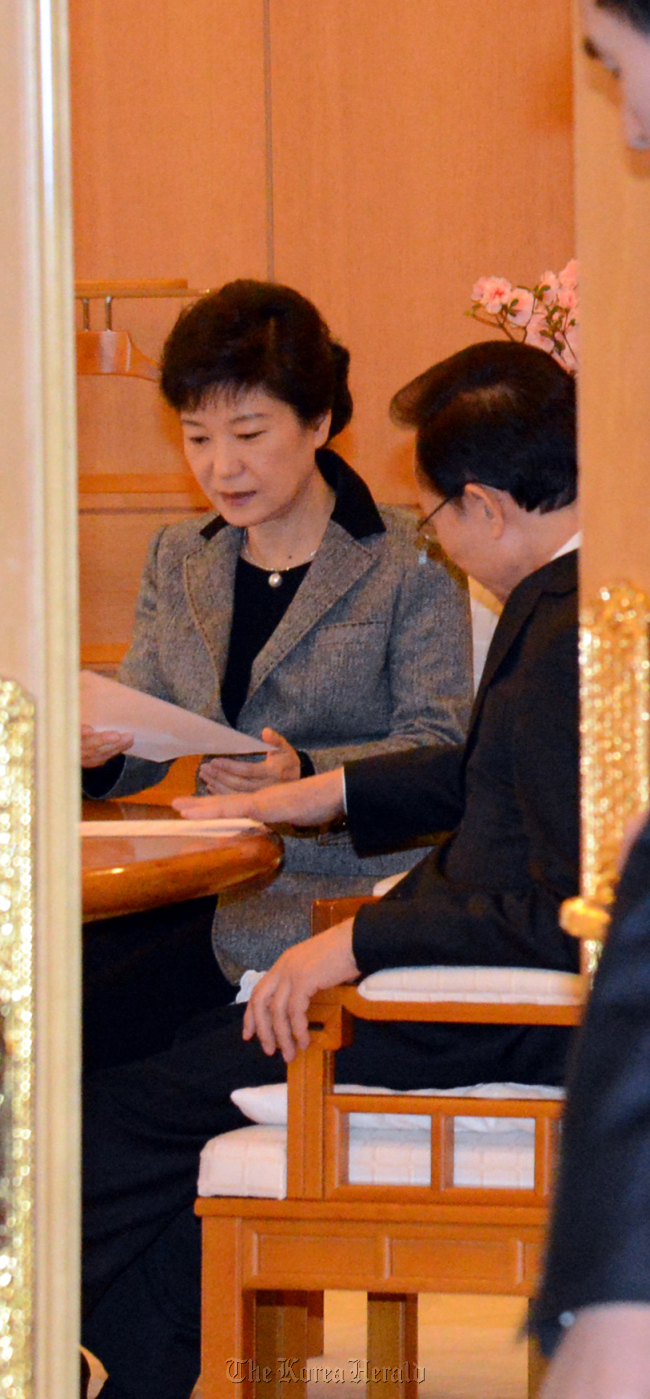North Korea’s nuclear test on Tuesday appears to have cast a cloud over President-elect Park Geun-hye’s policy of restoring dialogue and normalizing ties with Pyongyang.
During the election campaign Park championed a new “trustpolitik” doctrine calling for reengagement with the North while strengthening security against its provocations.
Now with the world moving to take action against the communist state, her dual-track approach is already facing a daunting challenge even before it is launched.
The incoming leader issued a condemnation of the North’s detonation which was conducted two weeks before her inauguration.
“The incoming government’s Korean Peninsula trust-building process cannot be realized by only one side’s effort,” she told a meeting with her foreign policy and security aides.
“As the old saying goes, it takes two to tango. We can carry it out together only if North Korea shows sincerity and an earnest attitude.”
Kim Jang-soo, a former defense minister named Park’s top presidential security adviser, signaled a potential policy shift.
“If a nuclear test is confirmed, things will not be the same as the past,” he said.
Park’s trust-building initiative was meant to be a fix to confrontational inter-Korean relations, which have spiraled downward over the past five years amid Pyongyang’s nuclear buildup and Seoul’s hard-line stance.
 |
President Lee Myung-bak and President-elect Park Geun-hye hold an emergency meeting over North Korea’s nuclear test at Cheong Wa Dae on Tuesday. (Chung Hee-cho/The Korea Herald) |
But her policy was met with skepticism amid growing tensions over the North’s persistent military ambition.
Some analysts said that the policy could easily veer toward Lee’s reciprocal, conditions-laden approach she herself blamed for the protracted chill between the two Koreas.
In addition, her plan rejects unconditional assistance and demands that the North meet prior commitments on denuclearization such as the one made in a July 4, 1972, joint statement.
Despite Park’s promise of economic aid and call for inter-Korean dialogue, her approach entails conditions similar to those of Lee, which put denuclearization ahead of reconciliation, said Chin Hee-gwan, a unification studies professor at Inje University in Gimhae, South Gyeongsang Province.
“Right now everything remains in a fog. But there should be challenges for the incoming government to distinguish itself from the predecessor in approaching North Korea issues, given that Park also speaks for conservative voters,” he said.
Hong Hyun-ik, a senior researcher at the private Sejong Institute, agreed that cross-border relations will remain on ice for the first few months after her Feb. 25 inauguration.
But he emphasized Pyongyang’s cautious attitude toward Park, contrasting its stringent rhetoric against the incumbent president.
“Now that North Korea has already detonated the bomb, she will have relatively more leeway in maneuvering her policy,” he told The Korea Herald.
“When the Obama administration undertakes talks with the North three to four months later even for a nonproliferation cause, her statecraft and vision will come into view.”
Victor Cha, director of Asian studies at Georgetown University and Korean chair at the Center for Strategic and International Studies, also noted that timing matters.
“The thinking is that if it happens before the inauguration, it might give the incoming government a little bit more room politically because everybody could see it as being in response ― a sort of farewell kiss ― to the departing Lee Myung-bak administration, which North Korea has no love for because they had a hard-line policy on North Korea,” he told the Council of Foreign Relations recently.
“On the other hand, if they conduct the test after the inauguration of the new government, then that leaves Park Geun-hye with very little room to improve relations.”
In her contribution to the journal Foreign Affairs in September 2011, Park unveiled the trustpolitik policy calling for the establishment of “mutually binding expectations based on global norms” between the two countries.
“The ones that have emphasized accommodation and inter-Korean solidarity have placed inordinate hope in the idea that if the South provided sustained assistance to the North, the North would abandon its bellicose strategy toward the South. But after years of such attempts, no fundamental change has come,” she wrote.
“Meanwhile, the governments in Seoul that have placed a greater emphasis on pressuring North Korea have not been able to influence its behavior in a meaningful way, either.”
She called for a new policy that involves aligning South Korea’s security with its cooperation with the North, and inter-Korean dialogue with parallel international efforts.
“An alignment policy would entail assuming a tough line against North Korea sometimes and a flexible policy open to negotiations other times,” she said.
Pyongyang, meanwhile, also called for the incoming Seoul government’s efforts to put cross-border relations back on track in the lead up to the nuclear test.
The Choson Sinbo, a Tokyo-based mouthpiece for the communist regime, said last week that the resumption of inter-Korean dialogue hinged on Seoul’s attitude under President-elect Park Geun-hye.
“In the wake of the United Nations Security Council sanctions, the new government’s behavior will be the touchstone for the ‘trust-building process’ for the normalization of the North-South relations,” the newspaper said, referring to Park’s pet initiative for peninsular peace.
North Korea “has concluded that the U.S.’ hostile policy had reached its peak through the UNSC resolution and declared the end of denuclearization talks,” the newspaper said.
“But there is enough possibility for the opening of the window of dialogue if the South attempts to resolve the standoff for the people’s common interests.”
By Shin Hyon-hee (
heeshin@heraldcorp.com)








